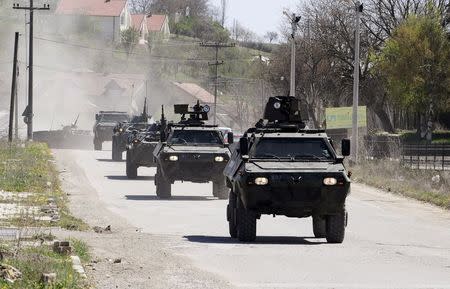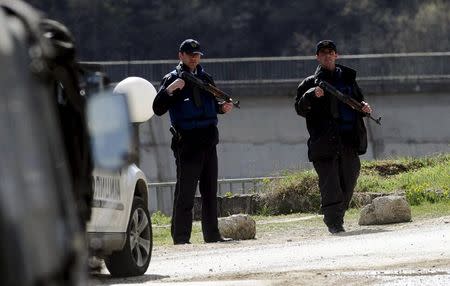Macedonia says Kosovo gunmen take police hostage overnight, call for Albanian state
By Kole Casule SKOPJE (Reuters) - Macedonia said on Tuesday 40 armed men in camouflage uniforms and speaking Albanian had crossed from neighboring Kosovo and taken several police officers hostage overnight, calling for the creation of "an Albanian state". Interior Ministry spokesman Ivo Kotevski said the gunmen released the officers after several hours and left the police post near Macedonia's border with Kosovo. He did not say where the gunmen went or whether Macedonian police gave chase. He described the gunmen as "UCK", an abbreviation that may apply either to ethnic Albanian guerrillas who fought Serbian security forces in Kosovo in 1998-99, or to those who took up arms in Macedonia during fighting in 2001. But police in Kosovo, a majority-Albanian former province of Serbia on Macedonia's northern flank, disputed the Skopje government's account, saying it had no evidence of armed men crossing the frontier. The incident was reminiscent of an insurgency in Macedonia in 2001 when Skopje's security forces battled rebels demanding greater rights for the former Yugoslav republic's large ethnic Albanian minority. Speaking in Albanian, the gunmen told their captives, "We will have an Albanian state," according to Kotevski. "This morning, Macedonian state institutions were the target of a terrorist act," he told reporters. Pro-opposition media in Macedonia cast doubt on the incident, suggesting it had been concocted by the government to divert attention from a growing scandal involving allegations of illegal wire-tapping and abuse of office. At the time, Prime Minister Nikola Gruevski was in Brussels, where European Union foreign ministers expressed "grave concern" at what they said was a deterioration in the rule of law, fundamental rights and freedom of media in the EU candidate-country. A Kosovo police spokesman said: "I can confirm that during our police work we have not witnessed any movement of individuals or criminal groups crossing illegally the border between Kosovo and Macedonia." Macedonian police nevertheless dispatched a special unit in armored vehicles to the area and helicopters were seen circling. Local residents were quoted in local media as saying they had not seen or heard anything unusual overnight. In late 2001, the guerrillas laid down their arms and entered politics in exchange for greater rights and representation for an Albanian minority estimated to account for about 30 percent of Macedonia's 2 million people. Macedonia was subsequently promised integration with NATO and the EU, but progress has been blocked by a dispute with Greece over Macedonia's name, which it shares with a northern Greek province. Ethnic tensions linger in Macedonia, fueled by frustration at the lack of progress toward the European mainstream and the jobs and prosperity many in the country hope will follow. (Writing by Matt Robinson; Editing by Mark Heinrich)



